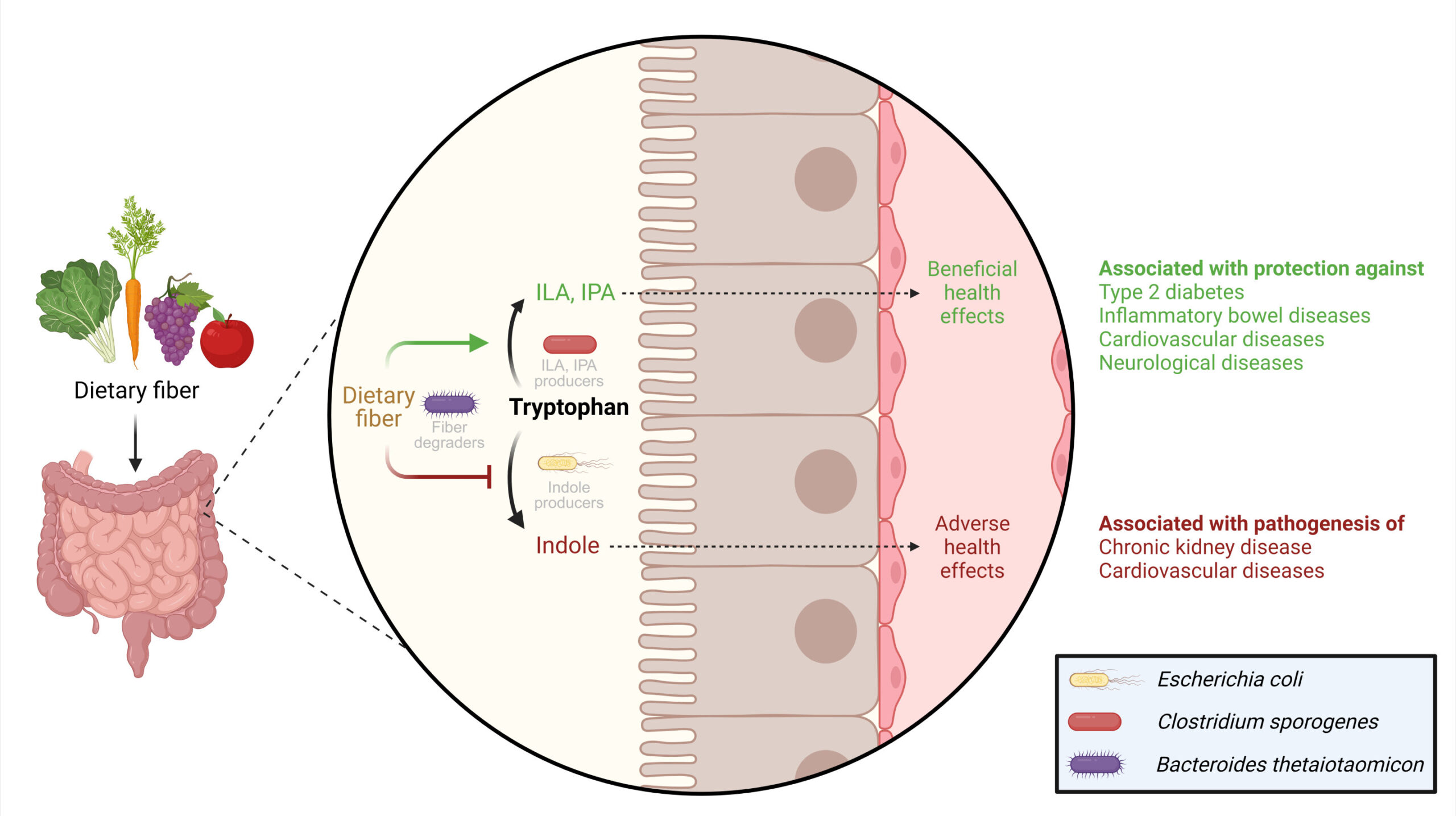Health
Dietary fiber appears to regulate the use of tryptophan by intestinal bacteria, which has an impact on health

The essential amino acid tryptophan is converted in the large intestine into useful or harmful substances. The research shows that tryptophan contributes to the production of the healthy substances Indole lactic acid (ILA) and Indole propionic acid (IPA) if we consume enough dietary fiber. However, if we do not consume enough dietary fiber, tryptophan is converted into the substance indole, which is associated with adverse health effects. The figure was created with BioRender (biorender.com) by Martin Frederik Laursen. Credit: The figure was created with BioRender (biorender.com) by Martin Frederik Laursen.
We get healthy dietary fiber by consuming fruits, vegetables and whole grains. But why is fiber so good for us? A team of researchers has discovered that dietary fiber plays a crucial role in determining the balance between the production of healthy and harmful substances, by influencing the behavior of bacteria in the colon.
Dietary fiber is good for our health, and scientists from the DTU National Food Institute and the University of Copenhagen’s Department of Nutrition, Exercise and Sports have now discovered a key part of why this is the case. Different types of bacteria in our colon compete for the use of an essential amino acid called tryptophan. This competition can lead to good or bad outcomes for our health.
The research, published in the news Natural microbiology, it appears that when we eat a lot of dietary fiber, intestinal bacteria help convert tryptophan into healthy substances. But if we don’t eat enough fiber, tryptophan can be converted into harmful substances by our intestinal bacteria.
“These results highlight that our dietary habits significantly influence the behavior of intestinal bacteria, creating a delicate balance between health-promoting and disease-related activities. In the long term, the results could help us design nutritional programs that prevent a range of diseases,” says Tine Rask Licht , professor at the DTU National Food Institute.
Dietary fiber determines the battle for tryptophan
Researchers have long known that dietary fiber is directly converted into healthy short-chain fatty acids by intestinal bacteria in the large intestine. However, the new research surprisingly shows that dietary fiber also contributes to good health by preventing the conversion of the amino acid tryptophan into harmful substances and promoting its conversion into beneficial substances in the large intestine.
“The gut bacterium E. coli can convert tryptophan into a harmful compound called indole, which is associated with the progression of chronic kidney disease. But another gut bacterium, C. sporogenes, turns tryptophan into healthy compounds associated with protection against inflammatory bowel disease, diabetes type 2, cardiovascular and neurological diseases,” said Anurag Kumar Sinha, researcher at DTU National Food Institute.
Through multiple experiments in bacterial cultures and mice, the researchers have shown that fiber-degrading intestinal bacteria, such as B. thetaiotaomicron, regulate the indole-forming activity of E. coli.
“B. thetaiotaomicron helps by breaking down fiber into simple sugars, which E. coli prefers to tryptophan for growth. The sugar components from the fiber prevent E. coli from turning tryptophan into indole, allowing C. sporogenes to use tryptophan to healthy connections,” says Anurag Kumar Sinha.
Understanding the behavior of intestinal bacteria
It is known that dietary fiber can change the composition and quantities of bacteria in our gut microbiome. However, just looking at the composition and abundance of microbial species in the gut won’t tell us much about their impact on our health.
“The field of gut microbiome research has had a strong focus on assessing the effects, for example of diet, on the amount of potentially good or bad gut bacteria, but often ignores that diet can regulate the activity of gut bacteria without necessarily major changes in the number bacteria.” species in the large intestine,” says Martin Frederik Laursen, associate professor at the DTU National Food Institute.
So, dietary fiber not only helps change the types of bacteria in the gut, leading to a healthier composition, but also influences the behavior of gut bacteria in ways that promote health.
“As a research community, we need to shift the focus from merely considering gut bacteria and their abundance as good or bad, to instead understanding how we make our gut bacteria behave good or bad,” says Martin Frederik Laursen.
This insight could help scientists develop better nutritional recommendations that keep our gut healthy and prevent disease.
Essential amino acids, such as tryptophan, must be obtained through the diet because the body cannot synthesize them. Protein-rich foods serve as a source of tryptophan. Examples include chicken, turkey, salmon, tuna, eggs, milk, cheese, yogurt, legumes, nuts and seeds. Dietary fiber is present in fruits, vegetables and whole grains.
More information:
Dietary fiber drives microbial tryptophan metabolism via metabolic interactions in the gut microbiota. Natural microbiology (2024). DOI: 10.1038/s41564-024-01737-3. www.nature.com/articles/s41564-024-01737-3
Quote: Dietary fiber appears to regulate tryptophan use by intestinal bacteria, impacting health (2024, June 25), retrieved June 30, 2024 from https://medicalxpress.com/news/2024-06-dietary-fiber- gut-bacteria-tryptophan.html
This document is copyrighted. Except for fair dealing purposes for the purpose of private study or research, no part may be reproduced without written permission. The content is provided for informational purposes only.













